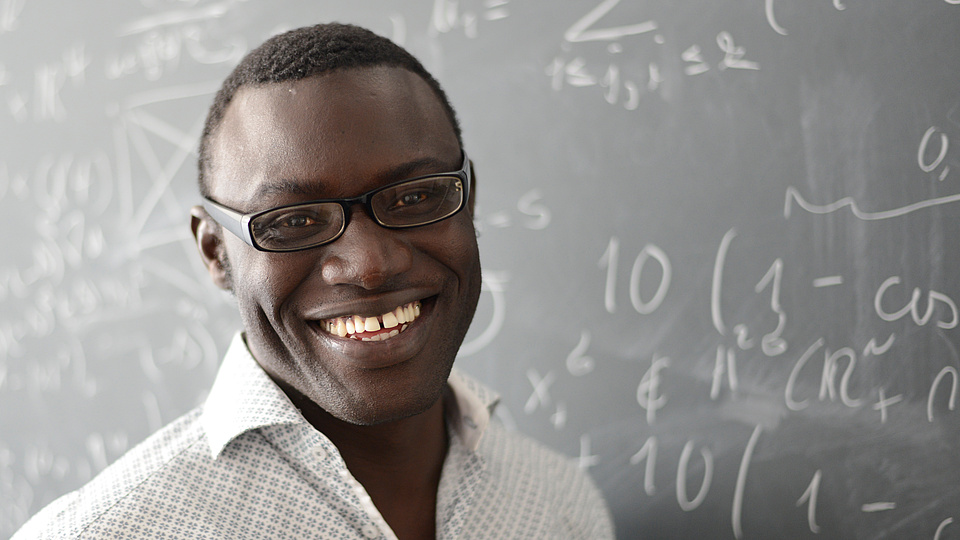Jump to the content
- {{#headlines}}
- {{title}} {{/headlines}}
Ryan Sweke – German Research Chair at AIMS South Africa
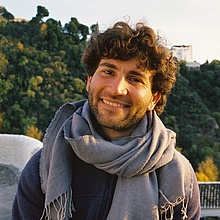
"I am sure that watching students grow and become successful scientists in their own right will be far more deeply satisfying than having papers in prestigious journals."
"My first visit to AIMS, and my first real exposure to quantum computing, was during a quantum computing workshop at AIMS in 2011. Since then, I have pursued a research career in quantum computing, and have always had a desire to return to AIMS."
Thus, Ryan Sweke at his computer screen in faraway California, a few months before taking up his new post. After two years working on basic research in the theory group at IBM Quantum, the native South African will be moving to AIMS South Africa as the holder of the German Research Chair on 1 January 2025 – with full conviction. “AIMS South Africa is a very special place, you enter the building and immediately feel that everyone here lives and breathes mathematics. It's not easy to be accepted at AIMS, everyone is highly motivated.”
Ryan Sweke is one of the leaders of the emerging field of quantum machine learning, a subfield of quantum computing. In 2016, he received his doctorate in physics from the University of KwaZulu-Natal, South Africa, with a focus on the development of quantum algorithms for simulating quantum systems. After his Ph.D., Ryan Sweke was awarded a Humboldt Research Fellowship at the Dahlem Center for Complex Quantum Systems at Freie Universität Berlin, where he spent almost five years.
Amongst other things, Sweke develops and analyzes algorithms for performing machine learning with quantum computers. As a result, this work sits at the interface of quantum computing and conventional machine learning. It is very timely, as enormous progress has been made in quantum computing in recent years. Indeed, since the first isolated prototypes of genuine quantum computers were built at the end of the 1990s, which were initially used to simulate quantum physical states, quantum computing platforms have now been developed by companies such as IBM, Google and IonQ, some of which can even be accessed remotely by anyone who is interested.
Quantum computers are still in the development phase. However, they hold great promise. It is known that future large-scale quantum computers which are robust to errors could solve certain problems faster than conventional computers. These advantages arise from the clever ways in which quantum algorithms can exploit properties of the quantum world. One such property is that of quantum entanglement, in which quantum particles are correlated with each other in ways that classical particles cannot be.
Whilst we do know that future quantum computers will have advantages over conventional computers in tackling certain problems, much more research is necessary to determine whether quantum computers can offer advantages for artificial intelligence applications, such as image and pattern recognition. More work is required to understand how quantum machine learning algorithms can meaningfully exploit the rich properties of the quantum world. Sweke finds this very exciting, “I enjoy thinking about algorithms, they have an aesthetic all of their own,” he says.
At IBM Research in California, he had wonderful colleagues and almost complete freedom in choosing his research questions. "I'm ready now for a new challenge. I've been lucky to have amazing mentors in my career and I'm excited to move into this role." One such mentor was Jens Eisert at FU Berlin with whom Sweke will cooperate as the holder of the AIMS research chair. "I am very much looking forward to teaching and working with students. Quantum machine learning is a rich interdisciplinary area with many fascinating mathematical questions. Ultimately though, I am sure that watching students grow and become successful scientists in their own right will be far more deeply satisfying than having papers in prestigious journals."
Mouhamadou Sy - German Research Chair at AIMS Senegal
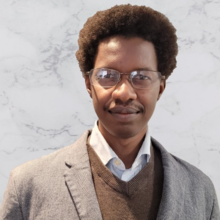
"I always intended to work in an African country, and I have two goals: to advance my mathematical research and to campaign for the development of mathematics in Africa."
When you listen to Mouhamadou Sy, you realise after just a few sentences how passionate he is about theoretical questions in mathematics. An expert for stochastic analysis and non-linear partial differential equations, he was born in the south of Mauritania, a country on the northwestern Atlantic coast of Africa. In the little village on the Senegal River, there was no primary school building or classrooms. Teaching often took place under a big tree.
“In the traditional school, we were taught a lot about the world through riddles. The teacher asked questions and we had to work out the answers. The ‘devinette’, using riddles as a teaching method, is actually an excellent way of introducing mathematical thinking,” Sy recalls.
Not until he got to secondary school, a long way away in the city, did Mouhamadou Sy sit at a school desk. The gifted boy was also interested in literature and theatre but, by the age of 13 or 14, already knew that he wanted to become a mathematician. “With mathematical functions you can theoretically describe every natural phenomenon in the world and sometimes even predict certain properties even if they have never been observed in that way before,” says Sy, enthusing about his subject.
Sy went to France to study mathematics at CY Cergy Paris University where an outstanding Master’s dissertation earned him a doctoral fellowship. In 2017, he completed his doctorate on Hamiltonian partial differential equations. The next stage of his career initially took him to the University of Virginia and from there to Imperial College London to become a research associate in the group of Field’s Medal winner, Martin Hairer. After a stint at Johns Hopkins University, Baltimore, United States in 2022, he assumed the German Research Chair at AIMS Senegal.
The riddles Sy works on today challenge the best mathematicians worldwide, such as the question as to the regularity of certain partial solutions to Navier-Stokes equations. The Clay Mathematics Institute has added them to the famous list of seven unsolved Millennium Problems. “The person who solves them gets a million US dollars,” says Sy, laughing.
Navier-Stokes equations play a role in the flow of fluids. “When it comes to the battle against climate change, Navier-Stokes equations are indispensable because they deliver mathematical models which help to explain atmospheric and oceanic phenomena as well as to improve climate forecasting,” says Sy, referring to the applications.
He is also a specialist in non-linear Schrödinger equations (NLS), an equation of nonlinear optics which makes it possible to capture and understand the wave-like dispersion of light particles in fibre-optic cables for information transmission. In the absence of this method, extremely fast telecommunications across huge distances and in computer networks would be unthinkable. When describing NLS and its significance for reality as comprehensibly as possible, Sy refers to them as an additional ‘enjeu’ which can be translated either as an additional ‘topic’ or ‘challenge’.
In any case, the students at AIMS Senegal will certainly be taught by a gifted teacher. Not just because of his own biography, Sy cares passionately about promoting young talents from Africa. This is why he has written maths textbooks, amongst others, in his native tongue, Pulaar. “Unfortunately, it is still the case that in many African countries like Mauritania and Senegal teaching at school is done in French or English but not in the children’s own language. I never had lessons in my mother tongue when I was at school,” says Sy, describing the education systems. Consequently, science subjects were also taught in a foreign language which often proved to be a hindrance. If you weren’t good at languages, you didn’t stand a chance of learning maths or biology. And anyone who had no access to higher education for social reasons couldn’t come into contact with scientific thinking and knowledge.
“I wanted to make sure that a basic knowledge of maths was available in as many African languages as possible. That’s something children, but also adults, have a right to because they are growing up in a world in which science plays a very big role. More people in Africa must have access to education in science. If the next Einstein is supposed to come from Africa, we must include everyone,” Sy believes.
AIMS in Senegal could be just the place for this because, for Sy, Senegal is a country of great cultural significance, steeped in history, that radiates positive energy far beyond its borders.
“Even during my studies in France, I always intended to work later in an African country. And in doing so, I have two goals: to drive my own mathematical research and to campaign for the development of mathematics in Africa.”
In this context, Sy will also cooperate with the Bielefeld expert for Navier-Stokes equations, Martina Hofmanova. And even if you do not understand anything about stochastic analysis, the probability that Sy will hit the headlines sooner or later seems pretty high – conceivably in connection with solving one of the seven Millennium Problems.
Nicholas Monk – German Research Chair at AIMS Ghana
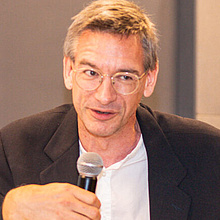
“Embedding an appreciation of key modelling skills in as wide a community of life scientists as possible is an important step in responding to the needs of Africa.”
New knowledge often emerges in areas that fall between disciplines. Nick Monk’s research and teaching work can be best summed up as “mathematics meets biology”. Since earning his doctorate in Theoretical Physics, the British mathematician has worked along the interface between mathematics and biology. “Mathematical models map complex biological processes, show the logic that governs them and enable a more profound understanding of these processes. At the same time, fundamental questions regarding concepts such as ‘collective behaviour’ and ‘decision making’ that are used in biological research have influenced the direction of mathematical research”, reports Monk. “These two disciplines shed light on each other, and the full potential this interface offers comes to light only in the course of a dialogue between highly qualified researchers on both sides.”
In the course of his career, the mathematician has supported and been involved in the growth and development of the disciplines Mathematical Biology and Computational Biology. For example, the recent head of the School of Mathematics and Statistics at the University of Sheffield has set up numerous research programmes, summer schools, conferences and workshops in and outside the United Kingdom over the last 25 years in order to build a worldwide community of specialists in Mathematical Biology and Computational Biology. He also has long-standing relations with AIMS Ghana and has instructed several courses in Mathematical Biology there. For Monk, it is particularly important, especially in his role as teacher and mentor, to help young researchers understand how important mathematical models are for the life sciences and to develop their modelling skills. He plans to continue pursuing this objective at AIMS in Ghana as the chair for the African continent. “Creating an awareness of the importance of mathematical models is an important step in responding to the needs of African countries”, said Monk. Young mathematicians have such a very important role to play in Ghana and other African countries because they will advance and strengthen science - and thus people’s welfare - in tackling challenges such as the fight against infectious diseases and climate change. “For example, understanding the mechanisms of plant growth and development underpins research that aims to make crops more robust and capable of producing higher yields. As Monk explains, mathematical models can show which changes in a genotype generate certain changes in the phenotype and how changes in genetic networks are related to external appearance and attributes.
When it comes to training young researchers in mathematics, Monk also finds it important to get girls and women excited about mathematics and to always counter any “fear of mathematics” right from the start. He aims to make vital contributions to the development of mathematical expertise in the area of modelling, specifically for the life sciences. To accomplish this, Monk wants to work together with mathematicians and biologists who work in these fields in Ghana and with colleagues in Germany. For example, collaborative projects in Ghana are already planned with Dr Emmanuel S. Adabor from Ghana Institute of Management and Public Administration and with researchers at the CSIR Crops Research Institute and the Plant Genetic Resources Research Institute.
Abebe Geletu – German Research Chair at AIMS Ruanda
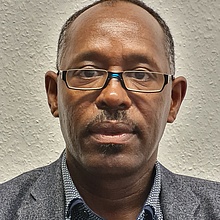
“Optimising systems will make a crucial contribution to modernising and technologising Africa.”
“I have seen it all with my own eyes in Ethiopia where I was born. On the continent of Africa, agricultural foodstuffs frequently rot whilst still on the market. And at the same time, in other places there are shortages. There is a lack of production control, central warehouses and delivery chains. Rural populations are hit particularly badly; given drought and climate change, it is a real disaster. The distribution of agricultural products can be optimised using applied mathematics. But that is only one area I would like to modernise through my work,” says Abebe Geletu.
Since embarking on his doctorate in optimisation at TU Ilmenau, Germany, in 1999, Abebe Geletu has repeatedly expanded his expertise in this sub-area of applied mathematics and has played the leading role in various German Research Foundation projects on optimisation and operating complex systems with the help of stochastic programming. In 2018, he completed his habilitation at the Institute for Automation and Systems Engineering at TU Ilmenau.
At AIMS Rwanda he wants to familiarise junior researchers with the application potential of mathematics to solve economic and societal problems. In addition to teaching and research, he will channel his expertise into practical applications together with interdisciplinary teams of engineers, computer scientists, hydrologists and energy experts.
“Particularly in microgrids in rural areas,” Geletu explains, “water management and energy supply are two of the fields in which optimisation will help to combat poverty and hunger.”
Abebe Geletu is a visiting professor at Haramaya University, Ethiopia, connections which he intends to utilise for research collaborations. Partners at TU Ilmenau will play a special role in the research collaboration. Especially with regard to water management, Geletu will cooperate with Technion – Israel Institute of Technology.
Jan Hązła – German Research Chair at AIMS RWANDA
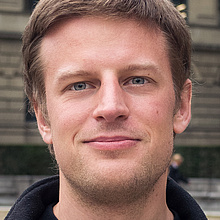
“My priority is to make young African mathematicians specialising in discrete mathematics more visible internationally.”
After finishing his doctorate at ETH Zurich in 2016, computer scientist Jan Hązła completed a stint at AIMS Rwanda, teaching programming. From that time, he knows all about the great potential and interest amongst many African students in theoretical computer science and discrete mathematics – areas that, so far, have not played a major role in mathematics education on the African continent.
“It is my dream to mentor and promote excellent doctoral candidates and students so that the results of cooperation can be published in prestigious specialist journals,” says Hązła, referring to his plans as the incumbent of a chair dedicated to theoretical computer science. Hązła wants to concentrate on providing personal mentoring for talented junior mathematicians at AIMS Rwanda. “I have good connections to thriving research groups in Germany, the United States and Switzerland and will do everything I can to connect my students at AIMS with international colleagues,” he explains. Cooperation with Goethe University in Frankfurt am Main, Germany, is one focus of his work.
Originally from Poland, Hązła’s own research interests include probability and coding theory. In practice, the computer scientist works at the interface between economic and societal issues such as whether opinion formation can be efficiently simulated using computer models.
Jan Hązła studied computer science in Kraków, Poland. After completing his doctorate at ETH Zurich and acquiring teaching experience at AIMS Rwanda in Kigali he became a postdoc at the Institute for Data, Systems und Society at Massachusetts Institute of Technology, Cambridge, USA. Most recently, he taught and conducted research as a postdoc at EPFL, Switzerland.
Bubacarr Bah – German Research Chair at AIMS South Africa
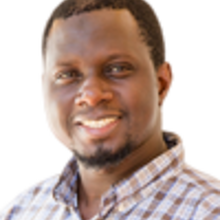
“Artifical Intelligence is becoming ever more important on the continent of Africa!”
In his field of work, he addresses the most important topics of our time: Big Data, machine learning and artificial intelligence. “These topics are becoming ever more important on the continent of Africa, too,” Bubacarr Bah predicts. Through his work, he wants to ensure that Africa is better equipped to meet future challenges in these areas. Since 2016, the mathematician from Gambia has held the German Research Chair in Mathematics with a Specialisation in Data Science at the African Institute for Mathematical Sciences (AIMS) in South Africa.
Two examples illustrate how his work is already making an impact: He cooperates with an agricultural firm that took thousands of aerial photographs of an orange plantation in order to predict crop yield. Bah and his team developed the requisite algorithms to evaluate the images. In addition, he cooperates with a medical research institute and helps to evaluate and interpret medical data which are increasingly being collected in Africa, as well. This could help to fight disease.
Bah completed his doctorate in applied and computational mathematics at the University of Edinburgh, UK, and subsequently continued his research at distinguished institutes at the École Polytechnique Fédérale de Lausanne (EPFL), Switzerland, and the University of Texas in Austin, United States. Returning to Africa is a great opportunity, he feels. “At AIMS I can not only continue my own research but also promote young mathematicians and build national and international networks.” He is convinced that talented mathematicians on the continent of Africa have good prospects.
Mouhamed Moustapha Fall – German Research Chair at AIMS Senegal
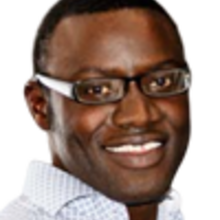
“Mathematics offers huge optimization potential to the African people.”
It was his teachers who had sparked his enthusiasm for mathematics when he was still a child, says Moustapha Fall. Having completed his doctorate at the renowned International School for Advanced Studies in Trieste, Italy, in 2009, he continued his research, amongst others, at Goethe University Frankfurt. His host at the time, Professor Tobias Weth, is full of praise: “He is completely unfazed by complicated, technically sophisticated issues” and was able to recognise lines connecting methods even between very disparate mathematical fields.
Since 2013, Moustapha Fall has held the AIMS Chair in M’bour, Senegal. His work is located at the intersection of analysis and geometry. His overarching goal is always to convince people of all educational backgrounds in Africa, whether graduates or illiterates, of the optimization potential of mathematics by using examples of practical applications. He thus tried to solve the problem of M’bour’s fishermen. He asked himself why they sometimes caught a lot of fish and sometimes hardly any. In cooperation with Professor Agostino Merico from the Leibniz Centre for Tropical Marine Research in Bremen, he studied cooperation behaviour among fishermen in M’bour. The team developed a mathematical model to predict the behavioural conditions under which fishing becomes a sustainable practice or leads to a human-resource collapse. There is now an App with which other scientists, including behavioural economists, can study fishermen behaviour and fish stocks dynamics under different experimental conditions.
Olivier Menoukeu Pamen – German Research Chair at AIMS Ghana
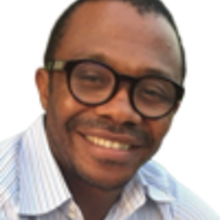
“The opportunity to give something back to my continent is invaluable.”
“The opportunity to give something back to my continent is invaluable,” said Olivier Menoukeu Pamen when he assumed the AIMS Research Chair in Mathematics and its Applications in Ghana in October 2016. The extent to which Pamen’s expertise in his special fields of probability calculation and statistics can benefit the continent is illustrated by one of the mathematician’s current projects: Just as in many African countries, microcredits are also very popular in Ghana. Pamen’s research has shown, however, that lenders often lack experience in realistically calculating refinancing costs, default probability and external influencing factors. As a result, the credits and the estimated interest are often granted on the basis of false assumptions. In order to help lenders put their calculations on a reliable footing, since 2019, Pamen has been working together with an institute in Ghana that grants microcredits.
Pamen’s engagement with financial mathematics goes right back to his doctorate at the University of the Witwatersrand in South Africa. He subsequently spent several years in Europe. After a postdoctoral sojourn in Oslo, he held a permanent position in the Department of Financial and Actuarial Mathematics at the University of Liverpool, United Kingdom. At AIMS Ghana he wants to share his experience with the students and apply his knowledge to current and future challenges facing Africa.
Gisèle Mophou – German Research Chair at AIMS Cameroon
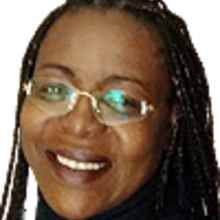
“Mathematics can help to solve some of the major problems of our times.”
“Mathematics can help to solve some of the major problems of our times,” says Gisèle Mophou, expressing her enthusiasm for her subject. She cites the example of her own working group at AIMS Cameroon where, from 2017 to the end of 2019, she holds the chair in Applied Mathematics with a Specialisation in Optimal Control: The researchers describe environmental pollution and health problems using mathematical tools from which they develop models that make the problems tangible and help to find ways of tackling them.
Mophou took a doctorate in numerical mathematics and assumed a professorship at the Université des Antilles et de la Guyane, Guadeloupe, in 2013. “I was looking for new challenges,” says the Cameroon-born researcher, explaining her motivation in accepting the chair at AIMS. “It was an opportunity to give something back to my own country.” She particularly promotes young, female researchers. “I have held lectures at universities and schools and told my own story, how, as a woman, I became a professor.” She wants to make people start thinking differently so that, in the future, more girls and women in Africa will be brave enough and also have the opportunity to enter academia.
Marc Sedjro – German Research Chair at AIMS South Africa
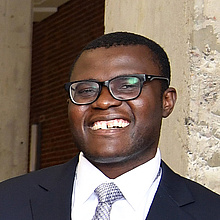
“I want my research to help refine existing methods and develop alternative approaches.”
Every year, tropical hurricanes claim lives and destroy entire regions. In Africa, the most recent example was Cyclone Idai which wrought devastation, especially in Mozambique, Zimbabwe and Malawi. If we want to reduce the impact of such storms in the future, better predictions about the exact path of the storm would be a way forward. “I want my research to help refine existing methods and develop alternative approaches,” says Marc Sedjro, describing one possible effect of his work. In 2019, the mathematician from Togo assumed the German Research Chair in Applied Mathematics with a Specialisation in Partial Differential Equations and Calculus of Variations at AIMS South Africa. He spent the previous two years in Tanzania as head of the AIMS Chair in Applied Mathematics.
In addition to fluid mechanics, Sedjro and his team conduct research into game theory. They investigate the mathematics behind large moving groups such as shoals of fish. In this field Sedjro also cooperates with the Information Theory Group at TU Berlin, Germany. He is well acquainted with the German research landscape having spent three years working on research at RWTH Aachen University after completing his doctorate at Georgia Institute of Technology in the United States.
Dealing with mathematics, Sedjro believes, has advantages that go beyond the subject itself: “Mathematics encourages logical thinking in general. We address issues without letting ourselves be influenced by emotions and opinions.” A skill that can prove very useful in many areas of life.
